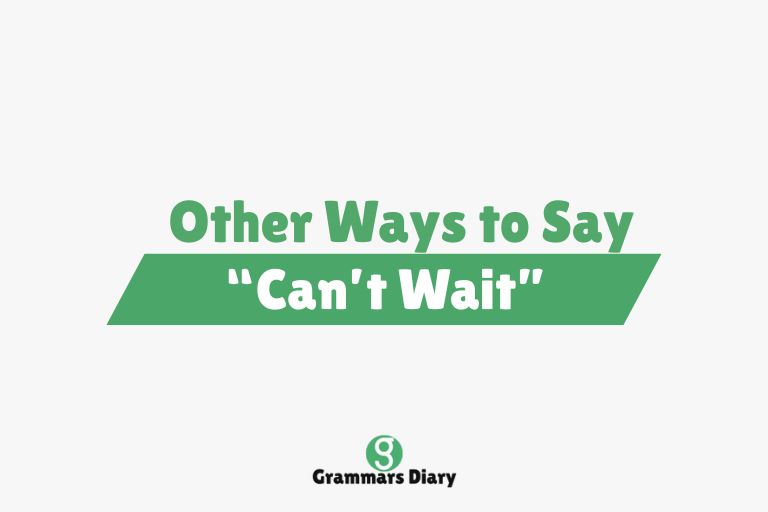The phrase “can’t wait” is commonly used to express strong anticipation or excitement about something that will happen in the near or distant future. When someone says, “I can’t wait for the weekend,” it reveals their eagerness or impatience for that event or time to arrive. While “can’t wait” is simple and effective, relying on it repeatedly can become repetitive, especially in both spoken and written communication where variation and tone matter.
Thankfully, the English language offers a wide range of alternatives—each capturing different shades of eagerness, enthusiasm, impatience, or positive expectation. Whether you’re expressing excitement in a casual conversation, building suspense in storytelling, or conveying urgency in professional writing, these phrases can help enrich your language while keeping your tone appropriate and engaging.
This article presents 18 useful ways to say “can’t wait,” helping you expand your vocabulary and communicate your emotions with more depth and clarity.
Other Ways to Say “Can’t Wait”
1. Looking forward to it
Example: “I’m really looking forward to our vacation next month.”
Meaning: This expression emphasizes pleasant anticipation and is widely used to communicate excitement for future events in both casual and professional settings.
Usage: Appropriate for emails, conversations, and formal occasions, especially when expressing enthusiasm in a polite and respectful way.
2. Eagerly awaiting
Example: “She’s eagerly awaiting the release of her favorite author’s new book.”
Meaning: Suggests a high level of anticipation, often with emotional investment or deep interest in the outcome.
Usage: Often used in writing and storytelling to evoke feelings of expectancy and excitement.
3. Counting down the days
Example: “I’m counting down the days until the concert!”
Meaning: Highlights a sense of urgency and strong excitement, often implying that time is moving too slowly in the person’s perspective.
Usage: Best for casual conversations or social media posts where the speaker wants to emphasize their anticipation.
4. On pins and needles
Example: “We’re all on pins and needles waiting for the exam results.”
Meaning: This idiom suggests nervous anticipation, where excitement is mixed with tension or worry.
Usage: Appropriate in situations where the outcome is important and the emotional state is intense.
5. Can hardly wait
Example: “I can hardly wait to see you again.”
Meaning: A slightly more dramatic version of “can’t wait,” expressing a deep level of impatience or excitement.
Usage: Works well in both spoken and written English, especially in personal contexts.
6. It can’t come soon enough
Example: “Friday night can’t come soon enough.”
Meaning: Indicates that the speaker is impatient and wishes the awaited moment would arrive immediately.
Usage: A casual, expressive way to show strong desire for an upcoming event.
7. I’m thrilled about it
Example: “I’m thrilled about starting my new job.”
Meaning: Conveys joy and happiness connected to a future event or opportunity.
Usage: Often used in formal and informal conversations to reflect professional excitement or personal joy.
8. I’m pumped
Example: “I’m pumped for the big game this weekend!”
Meaning: A very informal and energetic phrase that expresses high enthusiasm, often tied to sports or action-filled events.
Usage: Common among younger speakers or in casual social settings where high-energy excitement is the norm.
9. I’m buzzing
Example: “I’m buzzing about our trip to Tokyo next week.”
Meaning: British slang for being super excited or energized about something coming up.
Usage: Best suited for informal conversations, especially among friends or on social media.
10. I’m over the moon about it
Example: “I’m over the moon about our engagement party next weekend.”
Meaning: Expresses overwhelming happiness and joyful anticipation, often tied to personal or emotionally significant events.
Usage: Suitable for personal conversations, writing, or storytelling where deep emotional excitement needs to be conveyed.
11. I’m dying to
Example: “I’m dying to try that new restaurant you mentioned.”
Meaning: A strong, hyperbolic way to express extreme eagerness or impatience for something to happen.
Usage: Very casual and expressive, best used with close friends or in creative writing.
12. I’m stoked
Example: “I’m stoked about the road trip next week!”
Meaning: A slang term used primarily in American and Australian English to convey intense enthusiasm or excitement.
Usage: Best used in informal or youthful settings, especially when discussing fun or adventurous plans.
13. I can barely contain my excitement
Example: “I can barely contain my excitement about the concert tonight.”
Meaning: This phrase adds drama and emphasis, showing the speaker is emotionally overwhelmed by anticipation.
Usage: Appropriate for social media captions, speeches, or emotionally expressive writing.
14. I’m thrilled to bits
Example: “I’m thrilled to bits to meet the author in person next weekend.”
Meaning: A cheerful British expression that communicates intense joy or excitement.
Usage: Best for personal messages or enthusiastic storytelling with a touch of regional charm.
15. I’m itching to
Example: “I’m itching to start the new project.”
Meaning: Indicates restlessness or eagerness to do something, often with a slightly impatient tone.
Usage: Works in casual conversations or workplace settings where initiative and excitement are being conveyed.
16. I’m chomping at the bit
Example: “He’s chomping at the bit to begin training for the marathon.”
Meaning: A vivid metaphor that shows strong impatience, often with physical or metaphorical urgency.
Usage: Great for informal speech, writing, or figurative descriptions of eager behavior.
17. I’m raring to go
Example: “Everyone’s raring to go for the big presentation.”
Meaning: Suggests someone is fully prepared and enthusiastic about starting something right away.
Usage: Effective in both professional and casual settings to express energetic readiness.
18. I feel like a kid on Christmas Eve
Example: “I feel like a kid on Christmas Eve waiting for our trip to begin.”
Meaning: This simile expresses childlike joy, excitement, and impatience for an upcoming event.
Usage: Ideal for emotionally expressive writing, personal blog posts, or nostalgic descriptions of anticipation.
When to Use Different “Can’t Wait” Alternatives
In Social and Informal Conversations
In casual conversations with friends, family, or social media audiences, expressions like “I’m stoked,” “I’m pumped,” or “I’m buzzing” provide a fun, energetic tone that resonates with enthusiasm. These choices are perfect when excitement is unfiltered and the setting is relaxed.
In Formal or Professional Contexts
When you want to sound polite and enthusiastic in business emails, formal interviews, or workplace discussions, expressions such as “Looking forward to it,” “Eagerly awaiting,” or “Thrilled about it” are more appropriate. These maintain professional courtesy while still conveying positivity.
In Creative or Emotional Writing
Writers, bloggers, and storytellers can use vivid expressions like “Can barely contain my excitement,” “Feel like a kid on Christmas Eve,” or “Over the moon” to paint emotional pictures and help readers connect with the speaker’s feelings. These choices add color, tone, and voice to the narrative.
Conclusion
While “can’t wait” is a dependable and common way to express excitement or impatience, expanding your vocabulary with these 18 alternatives allows you to convey your feelings more vividly, appropriately, and creatively depending on the context. Whether you’re texting a friend, writing a formal email, or drafting a heartfelt blog post, choosing the right expression can make your message clearer and more engaging.
Having a richer vocabulary not only improves your communication skills but also allows you to better connect with your audience, reflect tone accurately, and keep your language fresh and expressive.
FAQs
What does “can’t wait” mean?
“Can’t wait” expresses strong anticipation or eagerness about something that is going to happen in the future. It shows emotional readiness or impatience in a positive way.
Is “can’t wait” formal or informal?
“Can’t wait” is mostly informal. For professional or business settings, it’s often better to use more polished phrases like “looking forward to it” or “anticipating it eagerly.”
Are “can’t wait” and “looking forward to it” the same?
They’re similar in meaning, but “looking forward to it” is more appropriate in formal writing, while “can’t wait” is casual and more expressive in tone.
Can I use these phrases interchangeably?
Many can be swapped depending on tone and context, but some are more formal while others are better suited for casual, emotional, or vivid speech.











